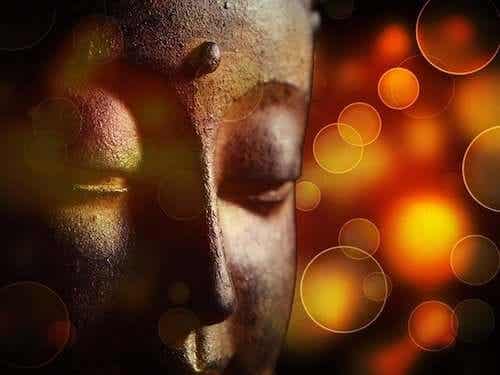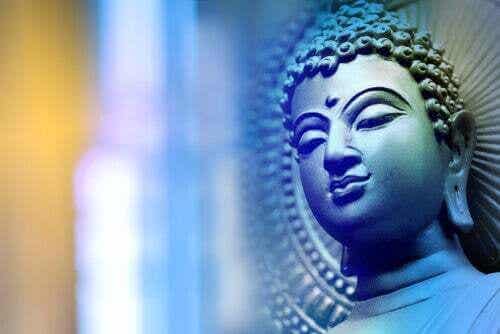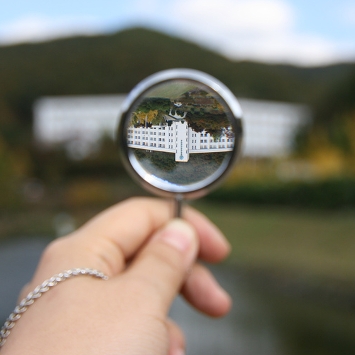Achieving self-knowledge is a complicated challenge. But reaching it means making a fundamental change in one's life. We explain how to do it.

Last update: June 27, 2020
In the pronaos of the temple of Apollo in Delphi you can read the inscription “Gnōthi Sautón”, which literally means “know yourself”. A profound message that has been handed down over time and that we can find in a large number of works by Greek authors. The author of this motto is said to be Socrates. Two simple words which, placed side by side, perfectly convey the concept of self-knowledge.
Self-knowledge (or self-knowledge) is the support and the door that opens the way to self-realization. It is that reflective process by which we know each other over time and which allows us to be aware of our inherent range of defects, virtues and all the other qualities present between each of these two extremes.
"When you start thinking differently and new thoughts emerge, you know yourself better."
-Estanislao Bachrach-
What does it really take to get to know each other better?
Knowing yourself is the starting point for making decisions aimed at improving your well-being and improving yourself day after day. Because those who know each other know what makes them happy, their needs and how far they can go. All this positively affects self-esteem and the ability to self-control.
Self-knowledge also influences the knowledge of one's rights, duties and responsibilities. In some ways, it provides a broader and more sincere view of oneself, which implies the opportunity to strengthen self-love, if it is weakened.
Self-knowledge leads to less impulsiveness and greater awareness of feelings, thoughts and actions. In some way, it allows the individual to always keep in mind the consequences of their actions and of all that they live and experience.
Getting to know each other is a powerful and personal adaptation strategy to the psychosocial environment and allows for self-acceptance. This is certainly one of the most positive abilities for any human being.
How is self-knowledge achieved?
In general, we tend to believe that we know each other well. We are convinced that we really know how we are. But the reality, very often, is very different.
Knowing yourself is not an easy task and can take years, even we may never know each other completely. Day after day, experiences greatly affect our way of being. Indeed, we could say that a person is different and changes in the different stages of their existence.
We are immersed in constant change and during life we undergo all kinds of transformations. In relation to the way we think, act and also understand our own existence.
The first requirement for achieving self-knowledge is therefore to be honest with yourself. To do this, we will have to get rid of the traps of self-deception and those mechanisms that are triggered, almost automatically, to protect us from time to time. It is about developing a profound analytical ability and trying to investigate our essence, which goes far beyond who we think we are.
The 6 phases of the self-knowledge process
- Self-perception: it involves the passive observation, even if realistic and intimate of one's being.
- Self-observation: it is about analyzing actions and behaviors in order to understand the reason for any behavior.
- Autobiographical memory: it is a question of reviewing the set of memories and experiences lived, in the course of life, from childhood until today. This will make it easier for you to remember what happened in the past, at a specific time and place.
- Self-esteem: this phase corresponds to the revision of self-love, of the consideration we have of our person and how we despise ourselves. Somehow, self-knowledge offers a map of self-love, which will help us understand how to take care of ourselves and act for our own good.
- Self concept: it is the set of characteristics that make up the image of oneself, which has been generated through value judgments.
- Self-acceptance: after the previous phases, in which one reflects on one's existence and one's feelings, it is time to accept oneself, to look in the mirror and to recognize oneself. Only then will the cycle of maturation and self-knowledge end.
Your job is to find out what your task is and to devote yourself to it wholeheartedly.
-Buddha-
Questioning one's conscience on matters of great importance can help to walk the path of self-knowledge. For example, we can ask ourselves: "who am I?" or, "what are my goals and dreams?". These are important issues that will allow us to discover many other aspects of ourselves.
Awareness is also an excellent tool for self-knowledge, as it will allow us to reach states of calm and serenity in which to deepen this inner investigation.
Knowing yourself is not easy. Investigating deeply, accepting all of us will take time, commitment and, above all, sincerity. Aspects that not everyone is willing to take into consideration. But which, if respected, will open the doors to an indispensable and valuable experience.


























